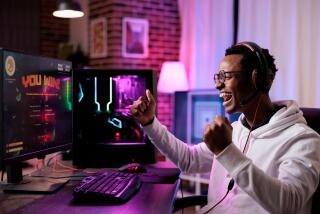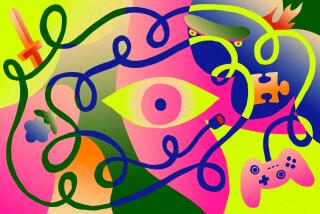It’s Super Mario to the Rescue : Personal health: If a child in a hospital is bored or frightened, video games can sometimes help.
- Share via
Dancing behind a line of gray laser beams, the bare-chested figure clutches a machine gun and waits impatiently for his prey. Four Nicaraguan soldiers creep into the picture. With a touch of a button, the four are blown away.
Kevin Murray feels better.
Lying on his stomach, his face awash in the blue light of a color monitor just inches away, the 8-year-old forgot all about meningitis, the painful spinal tap and the I.V. tube in his small hand.
Four floors below, Tyler Boone lay nearly motionless on his air-filled mattress, one hand bound in a splint and punctured with tubes. He was suffering from a rare complication of chicken pox, and his thighs were covered with enormous blood blisters.
Eight days in the hospital this summer made him a different boy, said his psychologist father, Rick Boone. Once gregarious, 7-year-old Tyler rarely spoke. But one small corner of his mouth moved upward as he soundly defeated his uncle at electronic baseball with one incredible triple-play.
“There’s no question that he picks up emotionally when he’s playing Nintendo,” said Boone. “His best day was when his friend came to visit and they played Nintendo. He was in really good spirits that day.”
Who would’ve thought the games criticized for their cartoon violence could actually be therapeutic?
About 18 months ago, Deborah Fingerhut was skeptical at best.
As a child life specialist at Long Beach Memorial Medical Center, Fingerhut’s job is to help young patients adapt to the fearsome hospital atmosphere. She oversees playrooms full of stuffed animals, simple puzzles and traditional board games--all of which were rendered nearly obsolete when 10 Nintendo machines were donated to the hospital in 1990.
Suddenly, children suffering through chemotherapy or heart problems or recovering from appendicitis took up the same cry, Fingerhut said: Give us Super Mario.
“I just wasn’t sure about it at first,” she said. “Sure, the kids loved it, but we also saw that it could be real isolating. We saw children who wanted to stay in their rooms with Nintendo instead of socializing in the playrooms.
“And some kids,” Fingerhut added sadly, “will lie and cheat just to play a little longer.”
Was it really a good thing, she recalled asking, for children to sit staring at a computer screen for hours, manipulating little buttons to blow things up?
Fingerhut and fellow child life specialist Rita D’Orazio decided to investigate the therapeutic value of Nintendo in a survey of 62 patients, 20 parents, 32 other child life specialists and 32 nurses. The answers surprised.
“We realized there were more benefits than we imagined,” Fingerhut said. “The games can be educational, they can help with eye-hand coordination and, more importantly, Nintendo is a normalizing experience for kids. Since most kids have a machine at home, when they play they can forget they’re in the hospital.”
Of 62 patients surveyed, 51 already had played Nintendo and 44 had a game machine at home. Better yet, most parents and health-care workers surveyed approved of the games, with minor reservations, she said.
Hospital workers then had a lot less guilt about letting children play Nintendo, noted Susan Perry, former director of Long Beach Memorial’s child life department.
Some parents have been concerned about the games Nintendo offers, but most have been happy that there is a diversion for their sick kids, said Fingerhut and Perry. So long as hospitalized children do their homework first and have time limits with the games, parents seem happy with the arrangement.
“At home, Kevin’s limit is an hour a day with Nintendo,” said Dennis Murray, who smiled as he watched his son’s gleeful intensity on the game called Contra. “Here he gets a little more leeway, but it really makes him feel better.”
When Kevin entered the hospital two days earlier, he had an alarmingly high temperature and a pounding headache--both symptoms of meningitis. That first day, the Nintendo machine sat mostly silent at the foot of his bed. Within 48 hours, Kevin was his old self: tongue stuck straight out as he concentrated on blowing away another group of soldiers.
“Kids need to play,” said Margie Campbell, a registered nurse who cares for children at Long Beach Memorial. “I mean, we poke them with needles and give them all kinds of nasty-tasting medicine, so this is a good diversion.
“It’s also a good bargaining tool when we need them to do something they don’t want to do.”
Armed with survey reports, Fingerhut and D’Orazio presented their findings to the annual meeting of the Child Life Council in Minneapolis last year and the Assn. for the Care of Children’s Health in Atlanta last May. They found many peers struggling with the same Nintendo-related issues as the games popped up in children’s hospitals nationwide.
“Those who had Nintendo wanted to discuss guidelines and therapeutic value,” D’Orazio said. “Those who didn’t have it were lined up asking me where to get one.”
Nintendo has also been a popular fixture at County-USC Hospital for the last two years, said Oswaldo Espinoza, coordinator of the hospital’s Starlight Express program. But his machines have been modified.
“We eliminated the Duck Hunt game, the one with the gun,” he said. “We didn’t want to promote a lack of respect for living species.”
The Long Beach Memorial and County-USC Nintendo machines came courtesy of the Starlight Foundation, an international nonprofit group dedicated to helping children with serious illnesses. Next month, Starlight will expand its program by delivering 161 new units to 65 hospitals in 10 cities nationwide, said Rulivia Lee, director of the Starlight Express program that delivers the Nintendos.
The Long Beach and County-USC units were donated by individuals and companies, through Starlight, and the new Nintendo units are being given by the manufacturer.
Within the year, Lee said, her organization will provide the machines to UCLA Medical Center and Campersdown’s Childrens Hospital in Sydney, Australia.
“I think we’re going to see a lot of kids who will now think of the hospital as a positive place--especially those kids without a Nintendo at home,” said Hilda Kwok, a Long Beach children’s psychiatrist.
“It’s true that some of the games are violent, but when kids have angry feelings about coming to the hospital, it’s better they blow away a few bad guys on Nintendo rather than punching out their neighbor.”
Tyler Boone would agree. A soft-spoken boy, his blue eyes became animated as he talked about the different levels of Super Mario. As his father hovered near his bedside, Tyler’s attention strayed back to the waiting game.
Nearly whispering, he said, “I like to win.”
More to Read
The biggest entertainment stories
Get our big stories about Hollywood, film, television, music, arts, culture and more right in your inbox as soon as they publish.
You may occasionally receive promotional content from the Los Angeles Times.










